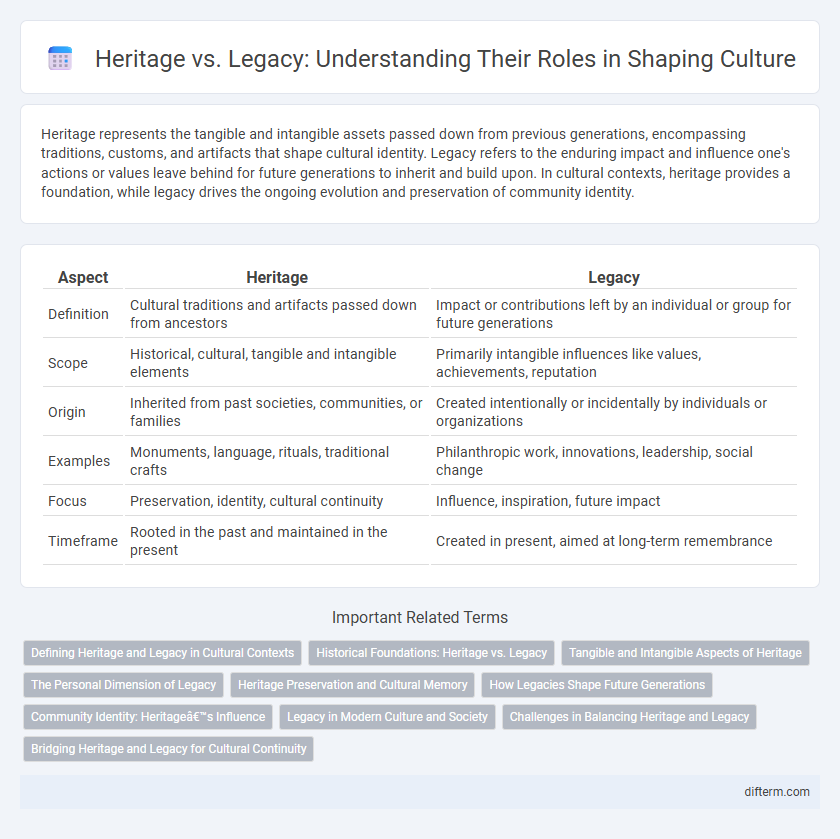Heritage represents the tangible and intangible assets passed down from previous generations, encompassing traditions, customs, and artifacts that shape cultural identity. Legacy refers to the enduring impact and influence one's actions or values leave behind for future generations to inherit and build upon. In cultural contexts, heritage provides a foundation, while legacy drives the ongoing evolution and preservation of community identity.
Table of Comparison
| Aspect | Heritage | Legacy |
|---|---|---|
| Definition | Cultural traditions and artifacts passed down from ancestors | Impact or contributions left by an individual or group for future generations |
| Scope | Historical, cultural, tangible and intangible elements | Primarily intangible influences like values, achievements, reputation |
| Origin | Inherited from past societies, communities, or families | Created intentionally or incidentally by individuals or organizations |
| Examples | Monuments, language, rituals, traditional crafts | Philanthropic work, innovations, leadership, social change |
| Focus | Preservation, identity, cultural continuity | Influence, inspiration, future impact |
| Timeframe | Rooted in the past and maintained in the present | Created in present, aimed at long-term remembrance |
Defining Heritage and Legacy in Cultural Contexts
Heritage refers to tangible and intangible cultural assets inherited from previous generations, including monuments, traditions, languages, and customs that shape collective identity. Legacy denotes the intentional transmission of cultural values and achievements designed to influence future generations and sustain cultural continuity. In cultural contexts, heritage establishes a foundation of shared history, while legacy represents the ongoing impact and responsibility to preserve and adapt these cultural elements.
Historical Foundations: Heritage vs. Legacy
Historical foundations reveal that heritage encompasses tangible and intangible cultural assets inherited from past generations, including artifacts, traditions, and languages that shape collective identity. Legacy, in contrast, refers to the deliberate transmission of values, achievements, and influences by individuals or groups, often intended to impact future generations. Understanding the distinction between heritage and legacy is crucial for preserving cultural continuity while fostering purposeful contributions to societal evolution.
Tangible and Intangible Aspects of Heritage
Heritage encompasses both tangible elements like monuments, artifacts, and architecture, as well as intangible aspects such as traditions, language, and rituals passed down through generations. Legacy refers to the impact and values inherited from these tangible and intangible cultural assets, shaping contemporary identity and societal values. Preservation of heritage ensures the continuity of cultural expressions, while legacy reflects the ongoing influence and adaptation of these cultural components in modern contexts.
The Personal Dimension of Legacy
Heritage embodies the collective cultural identity passed down through generations, while legacy reflects the personal impact individuals imprint on future narratives. The personal dimension of legacy emphasizes how individual values, stories, and achievements influence cultural evolution and communal memory. This dynamic interaction shapes not only societal heritage but also the unique contributions that define personal significance within a broader cultural context.
Heritage Preservation and Cultural Memory
Heritage preservation safeguards tangible and intangible cultural artifacts, ensuring the transmission of identity, traditions, and values across generations. Cultural memory shapes collective understanding by encoding shared experiences into narratives, rituals, and symbols that reinforce community cohesion. Prioritizing heritage preservation strengthens cultural resilience, allowing societies to maintain continuity while adapting to contemporary challenges.
How Legacies Shape Future Generations
Legacies serve as powerful conduits through which values, traditions, and achievements are transmitted to future generations, shaping their identity and worldview. Unlike heritage, which encompasses inherited cultural artifacts and customs, legacies actively influence ongoing social narratives and inspire purposeful actions. By embodying lessons from past experiences, legacies foster resilience, innovation, and a sense of responsibility in descendants, ensuring cultural continuity and evolution.
Community Identity: Heritage’s Influence
Heritage shapes community identity by preserving traditions, languages, and customs passed down through generations, fostering a sense of belonging and continuity. It encompasses tangible artifacts and intangible practices that collectively define a group's historical experiences and values. This deep-rooted cultural inheritance strengthens social cohesion and informs shared narratives essential to community resilience and pride.
Legacy in Modern Culture and Society
Legacy in modern culture shapes societal values, influencing identity and collective memory through inherited achievements and traditions. It drives cultural evolution by preserving significant contributions while adapting them to contemporary contexts. Modern legacy emphasizes sustainability and inclusivity, ensuring diverse narratives endure across generations.
Challenges in Balancing Heritage and Legacy
Balancing heritage and legacy presents challenges in preserving cultural identity while adapting to contemporary values and societal change. Heritage often involves safeguarding traditions and artifacts, yet legacy requires interpreting these elements to inspire future generations. Conflicts arise when maintaining historical authenticity clashes with the need for modernization and inclusivity in cultural narratives.
Bridging Heritage and Legacy for Cultural Continuity
Bridging heritage and legacy ensures cultural continuity by preserving traditional customs while adapting them for future generations. Heritage encompasses the inherited practices, artifacts, and values passed down through time, whereas legacy reflects the impact and contributions individuals or communities leave behind. Integrating both fosters a living culture that honors the past and inspires ongoing transformation.
heritage vs legacy Infographic

 difterm.com
difterm.com